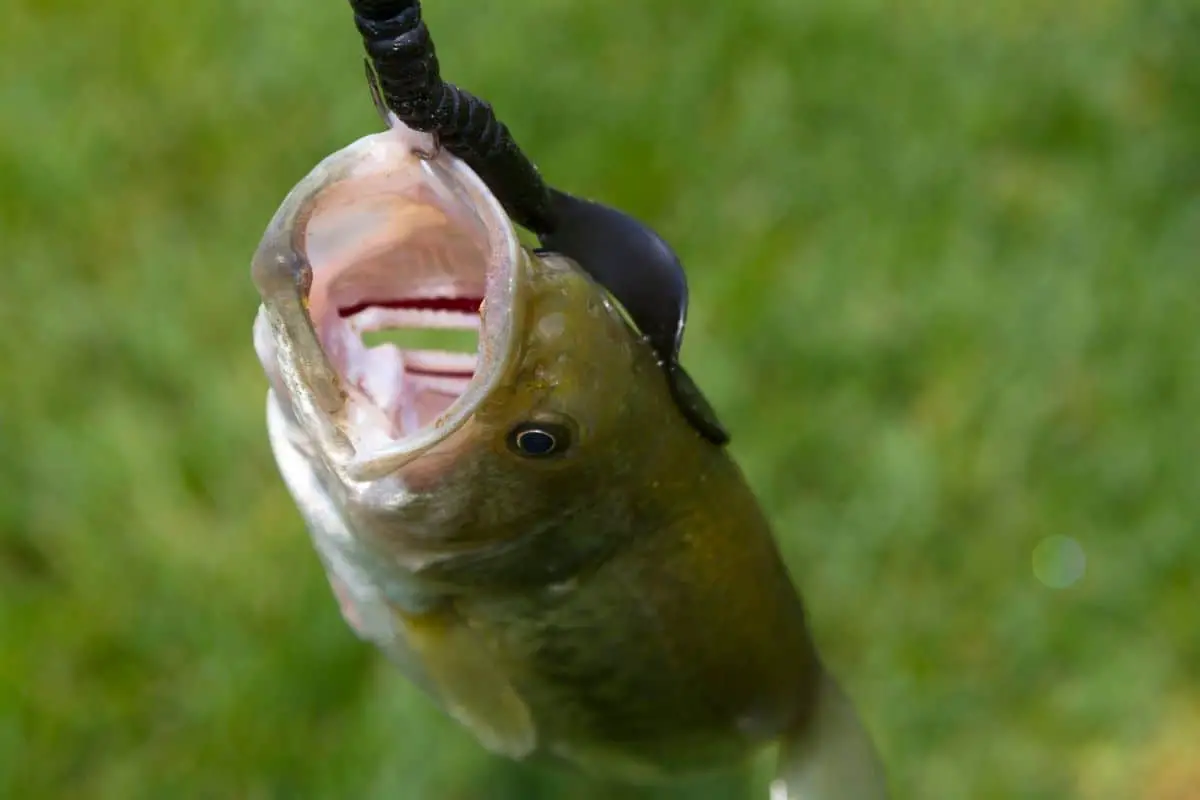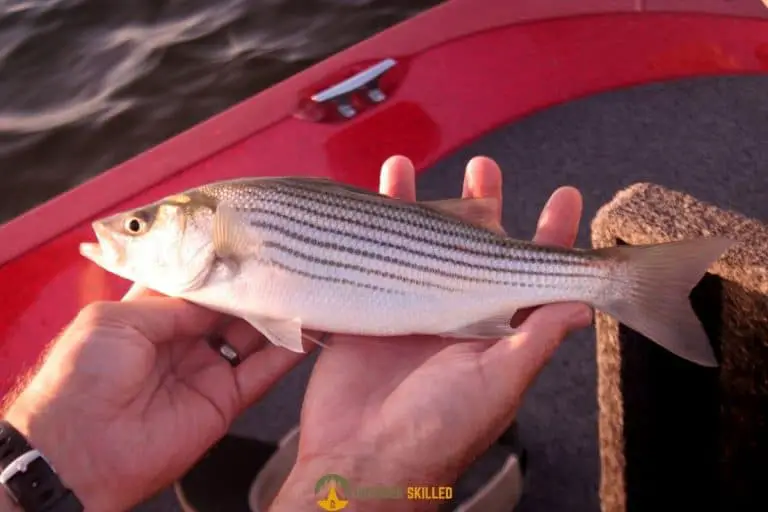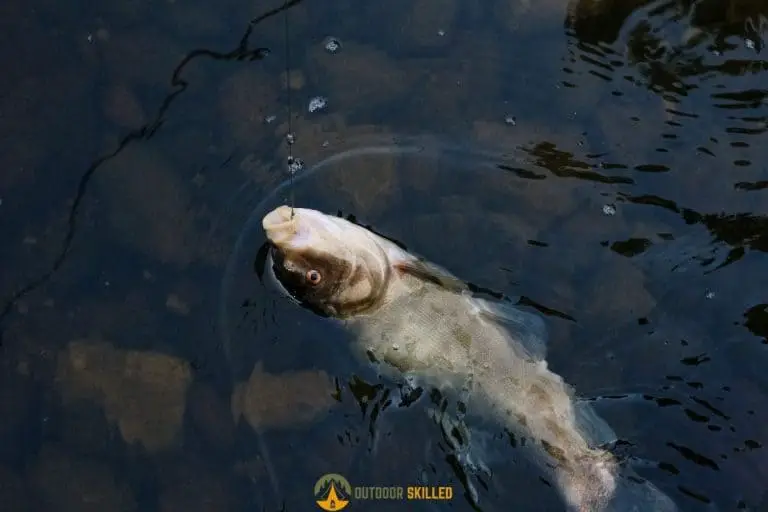Do Bass Bite Humans? Bass Aggression and Safety Tips
Bass fishing can be very rewarding because bass fish are hard fighters. However, like most fish, bass fish are afraid of humans.
A fish biting a human in the water is extremely rare and barely ever happens. The main thing you really need to be concerned about is how to hold the fish correctly in order to avoid causing any injury to yourself or causing damage to your catch.
So, do bass bite humans? Bass do not bite humans. That is because fish are generally afraid of humans. However, bass fish may cause some scratches on your thumb as they will begin to squirm and twist from side to side when you’re holding them. This can be easily avoided by wearing thick gloves.
Keep reading more to learn more about bass fish’s teeth and how to correctly hold bass fish to avoid causing any injuries.
Table of Contents
Do Bass Have Sharp Teeth?

The most popular species of bass fish are the largemouth bass and smallmouth bass.
The largemouth bass is green with horizontal stripes and spots on its body. Its dorsal fin has a break in it which makes it look like two separate fins on the top of its head and its jawline is long and extends past its eyes.
On the other hand, the smallmouth bass is brown with vertical stripes on its body. Its dorsal fin is one continuous piece without breaks. It has a small mouth and its upper jawline doesn’t extend past its eyes.
Both largemouth and smallmouth bass have fairly sharp teeth even though you may not be able to see them. That is because their teeth are small and facing inwards.

Their teeth are described as needle-like and feel like sandpaper to touch, however, they are not large enough or strong enough to hurt or do any significant damage to a human.
The main purpose of bass’ teeth is to help them snatch and keep a solid grip on their thrashing prey before killing it inside their throats. While different species of bass prefer different foods, they all mainly use their teeth for the same purpose.
If you are intending to go bass fishing anytime soon, make sure to get ready and upgrade your gear with these uncompromising Bass Spinning Reels.
Can Bass Cut You?
Bass can cut you if you do not handle them properly. While their teeth do not have the power to rip your fingers off, they still may scratch at your skin.
Aside from having sharp teeth, bass have very sharp gill plates that can cut you if you accidentally rub your hand against them, so it’s not recommended to hold a bass by the gills.
They also have sharp spiny dorsal fins that they will raise if they feel threatened, however, the fins will compress if you’re handling the bass fish correctly.
To avoid getting cut, it’s highly recommended to wear thick gloves when handling a bass. It’s also best to avoid rubbing your hand from the tail of the fish to its head and try to have one finger press down on the front of the dorsal fins. This will keep the dorsal compressed and less likely to cut you.
How to Properly Hold Bass Fish?
You may think that holding a bass is easy, however, knowing the proper method of lipping a bass fish without getting yourself hurt is the sign of a truly experienced bass angler.
The term “lipping” refers to the way you get bass out of the water and handle it before you release it back to the water. It’s referred to as “lipping” because you quite literally hold a bass by its lip to control it while you’re holding it.
There are two main things you need to keep in mind when holding a bass fish.
The first thing is to avoid removing the fish’s slime coat. That is because a fish’s slime coat acts as a barrier to protect the fish from infection and diseases. It also helps prevent the loss of essential bodily fluids.
The second thing is to protect the fish’s jaw. That is because putting too much pressure on a fish’s jaw can affect its ability to catch prey when you release it back into the water.
There are some professional techniques you could utilize to help you properly handle bass fish and prevent causing harm to the fish and to yourself as well.
Let’s take a look at the most common methods of holding bass fish:
- The Vertical Hold
Most fishing professionals agree that this is the safest way to hold a bass.
You need to hold the bass vertically with its mouth facing towards the sky and its tail pointing toward the ground. This will help relieve any pressure on the bass’ jaw from the weight of its body.
When you’re holding a bass vertically, you need to make sure you keep your thumb placed inside the mouth of the bass to ensure you have a firm hold of its bottom lip. You also need to press the rest of your fingers against the outside of the bass’ lip and keep gripping firmly to avoid dropping the fish.
- The Horizontal Hold
The horizontal hold is considered a lot more visually appealing, especially for taking a “prized catch” photo.
You can get your grip right by following the same advice for the vertical hold, that is by having your thumb placed inside the bass’ mouth at the bottom lip while pressing the rest of your fingers on the outside of the lip.
Then you need to use your other hand to gently support the body of the fish right behind the anal fin. Make sure to keep the bass’ mouth in a position that is slightly higher than the body to reduce some of the pressure on the fish’s jaw.
- The Angled Hold
The angled hold is more suited for smaller bass, as it could cause damage to the jaw of larger bass in almost all circumstances. That is because holding a bass at an angle greater than 10 degrees can result in putting too much pressure on the fish’s jaw.
You can also learn how to handle a Tiger Musky here.
What to Do If a Bass Fish Bites You?
If there’s bleeding, you need to apply direct pressure to the wound using bandages. If the bleeding does not stop, try adding more bandages on top.
If the wound is minor, you can wait until bleeding has stopped then rinse the wound with fresh water. Make sure to apply antiseptic and dress the wound to help prevent any infection.
For more serious wounds, however, it’s better to call emergency services as stitches may be required.
If you are going Bass Fishing, don’t forget to check out these Bass fishing lines that give you the best value for your money.
Related Questions
Why Is It Better to Release Bass After Catching It?
It’s better to release bass after catching to preserve the fish population as bass are considered very popular game fish. However, it’s not a problem to keep a few of the smaller catches while releasing the bigger catches. That is because bigger catches are often female breeders that produce thousands of eggs during each spawning season.
How to Safely Unhook Bass Fish?
In order to safely unhook bass fish, you need to reel your catch in until you can grab it with your hand. Next, you need to hold the underside of the fish and slide the hook carefully out of its mouth. Then you can lip the bass to hold it more firmly in place.
What Does the Term Bass Thumb Mean?
The bass thumb is a term that’s commonly used to describe what happens to your thumb after catching and handling a lot of bass throughout your fishing trip. For many anglers having a “bass thumb” can be considered flattering as it means they have caught a lot of fish.
Helpful Resources
Big Book of Bass: Strategies for Catching Largemouth and Smallmouth – ( you can also check it on Amazon here)



![Why Do Bass Have Red Lips? [Explained Simply]](https://outdoorskilled.com/wp-content/uploads/2022/06/bass-fish-2-768x512.jpg)



![The 5 Best Bass Boats For The Money – After Testing Dozens! [Updated]](https://outdoorskilled.com/wp-content/uploads/2021/08/bass-fishing-boats-768x512.jpg)
